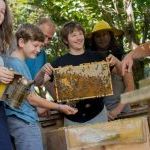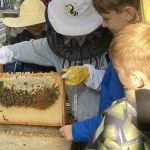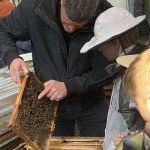Bee Kids
For those children who are interested in bees, the beekeepers association 'Biene Wien West' runs a project for local children where around fifteen young beekeepers meet each Saturday afternoon to look after the ten hives. Each child is given responsibility for a hive which, with support from experienced beekeepers, they tend to during the weekly meetings. The children learn to deal responsibly with the bees and start to see see the importance of bees in the natural world. The children's apiary is free of charge for children and young people and they are allowed to take home some honey at the end of each season.
Website
Country
Media
Photographs by R. Aker, W. Marcombe, Biene Wien West
Useful links:
The British Beekeeping Association provides information on beekeeping in schools
* TOP TIP *
'Help the bees by sowing bee friendly seeds in your school grounds'
How is the project linked to climate change & sustainability?
Honey bees are busy little creatures! They spend much of their time visiting flowers, collecting nectar for the hive and in turn, pollinating the flowers. By doing this, bees play a key role in the maintenance of plant biodiversity. The process of pollination also leads to the production of vegetables and fruits, which are food for mammals, birds and other creatures - and ultimately also for humans. By supporting bee colonies, we are supporting highly complex networks of life and gaining a deeper understanding of the inter-connectedness of all living things. The Bee Kids project gives inner-city children the opportunity to immerse themselves in nature and to observe the direct effects of climate change upon bee colonies and in turn, the impact that reduced numbers of pollinators can have upon food supplies.
Who is involved?
The Chairman and members of Biene Wien West support the children, guide their work and provide all of the necessary equipment. They also designate suitable hives for the children to look after.
How are the participants involved?
The Bee Kids do all the work of beekeepers throughout the year. They take responsibility for their bee hive, visiting the bees every week and checking the health of their colony. During the winter months, the children are able to turn their hands to carpentry and make new frames for the hives. They also check whether there is enough food and water for the bees during these colder months. If necessary, they feed the bees. Oher important jobs involve collecting swarms of bees in the local area and helping to breed Queen bees. When it is ready at the end of the season, the children spin the honey and put it into jars. They have the chance to taste it and to design the labels for the jars. Nothing goes to waste and the beeswax is used to produce wax candles for Christmas.
Key steps
- Contact your local beekeepers association to see if they are able to help.
- Find someone local with bee hives where you can take the children to visit.
- Decide how 'hands on' you want the group to be. Will you just go and see the hives, or do you want to be more involved?
- Make sure that you write a risk assessment for the visit.
“It´s cool being a Bee Kid. You get great honey and you lose the fear of being stung.”
11 year old Bee Kid
"I was once stung by a bee. The bee very carefully twisted out of my skin and survived. That made me really happy! It was interesting to watch that."
12 years old Bee Kid



